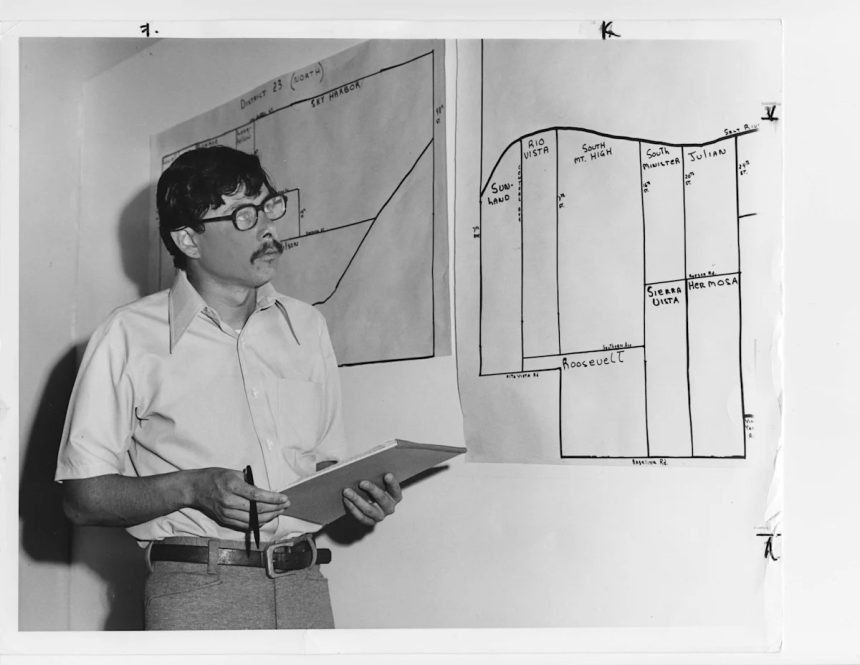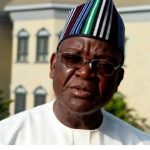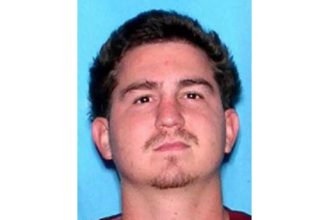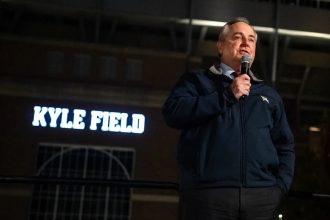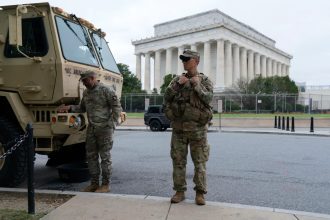People were expected to gather at 3 p.m. on Oct. 26 at the Salvation Army Kroc Center in Phoenix for a celebration of the life of Alfredo Gutierrez, a progressive political leader whose influence in Arizona spanned decades.
Gutierrez died July 29 from cancer. He was 79.
Gutierrez’s life was filled with many roles — Army private, civil rights activist, state lawmaker, Arizona Senate majority and minority leader, gubernatorial candidate, political consultant and radio host, among others — linked by his desire to improve the lives of immigrants and increase access to education.
He helped found Chicanos Por La Causa and Valle del Sol, two Latino organizations that provide social services to working-class families. Gutierrez also was instrumental in opening South Mountain Community College to serve students in predominantly Latino and Black neighborhoods in south Phoenix.
Longtime community activist Lydia Guzman saw Gutierrez at a community meeting three weeks before he died. While some remarked that he looked frail, Guzman said Gutierrez was as fiery as ever.
“He lit the fire under a lot of folks until his last days,” she said shortly after he died.
The meeting was called to discuss ways to counter the Trump administration’s mass deportation policies. Gutierrez, she said, “was shouting and he was waving his finger in the air and he stressed the importance of civic engagement.”
Gutierrez served in Vietnam, then led protests at ASU
Gutierrez grew up in a working-class family in Miami, an Arizona mining town east of Phoenix. At 17, Gutierrez enlisted and spent three years in the Army infantry, including a year fighting in Vietnam as a sharpshooter and carrying out operations as part of a special unit.
While in the military, he realized that the soldiers he met who had college degrees were no smarter than him.
“They had no common sense, I thought, on how to deal with the realities that are imposed upon you in the Army in the ’60s,” Gutierrez said in 2024. “So the idea of going to college became agreeable to me. It was no longer the impossible barrier to me.”
When he came home from Vietnam, Gutierrez enrolled at ASU on the GI Bill. He was the first person in his family to attend college.
It was a time of large student protests on college campuses. The civil rights movement, the Chicano movement and the anti-Vietnam War movement were all taking place.
Inspired by Cesar Chavez, the farm worker advocate and civil rights leader, Gutierrez helped form the Mexican American Student Organization at ASU, which later became Movimiento Estudiantil Chicano de Aztlán, also known as M.E.Ch.A.
Alfredo Gutierrez in June 1972.
One of the Mexican American Student Organization’s main causes became fighting for Mexican women, many undocumented, toiling in deplorable conditions for low pay at a laundry that washed bedding for sororities and fraternities on campus under contract with ASU.
Gutierrez led protests demanding ASU pressure the laundry to improve working conditions and wages. When the university refused, Gutierrez helped lead a group of students who took over the president’s office for several days.
In response, state troopers surrounded the building, the Arizona Board of Regents demanded the students be expelled, and the Legislature asked the governor to call up the National Guard, Gutierrez said.
“It was kind of crazy,” Gutierrez said.
Gutierrez said the university was determined to kick him out. He said he was accused of violating a student code of conduct the university rejiggered specifically to force him out. He was given a choice, he said: be expelled with no chance of returning or leave voluntarily with the opportunity to reapply for admission in the future.
“I chose to leave so I could come back,” Gutierrez said.
But Gutierrez never went back.
He got married, had a baby and needed money to support his family.
“Life happened,” Gutierrez said.
Arizona politics and activism: Marana residents boo and hiss at the prospect of ICE center
‘Alfredo’s store’: Gutierrez was dealmaker in Arizona Legislature
Gutierrez went to California to work with Cesar Chavez organizing farmworkers. He also worked for Robert F. Kennedy’s 1968 presidential campaign. He was at the Ambassador Hotel in Los Angeles the night Kennedy was shot on June 5, 1968.
After Kennedy’s death, Gutierrez was among the first to receive a Kennedy Memorial Fellowship to spend 18 months training to pursue a career in politics, public service and social justice. The stipend allowed him to support his family, and the experience was life-changing. It put Gutierrez in contact with some of the day’s most prominent and important social justice and civil rights leaders.
“I attended a number of seminars with some extraordinary people, went to Harvard for special programs and in D.C. met with some unbelievable folks,” Gutierrez said. The people he met included U.S. Sens. Ted Kennedy and J. William Fulbright and political activist Ralph Nader.

Sen. Alfredo Gutierrez, one of the leaders in the Hispanic community, in front of one of the most recognizable landmarks of the Hispanic community, Our Lady of Guadalupe Church in Guadalupe on April 8, 1998.
In 1972, when Gutierrez was 27, he ran for the state Senate in District 23 and won. Two years later, he was selected to serve as Senate majority leader. Gutierrez spent 14 years in the Legislature, most of that time in leadership roles.
To Democratic Gov. Bruce Babbitt, Gutierrez was an eye-opener when Babbitt suddenly ascended to the office in 1978.
“I quickly learned that my success was in his hands,” Babbitt said in a phone interview from Washington, D.C., shortly after Gutierrez’s death.
“He really ran the Legislature in many ways,” Babbitt said. “We all referred to the Legislature as ‘Alfredo’s store’: Any Republican who needed something came to Alfredo first.”
Pete Rios, a former state Senate president, said Gutierrez earned the nickname “Captain Chaos” for his ability to divide the Republican caucus.
Gutierrez used the leverage he had over Democratic votes to extract concessions from Republicans when they were in power. His “store” was the epicenter of classic deal-making, resulting in more funding for the underserved populations that Gutierrez advocated for.
Babbitt said Gutierrez was regarded as a “wild-eyed” lawmaker, a reputation the south Phoenix legislator enjoyed.
“But in fact he was the consummate politician, a dealmaker,” Babbitt said, calling Gutierrez perhaps “the most important legislator in my life.”
While in the Legislature, Gutierrez pushed for Arizona to finally join the Medicaid program. Since then, the Arizona Health Care Cost Containment System, or AHCCCS, has provided health care to millions of low-income families and individuals.
Stories abounded about Gutierrez’s sway at the 90-member state Legislature.
“They used to say it was 89 people surrounded by Alfredo,” recalled Terry Goddard, who watched Gutierrez’s maneuvers long before he himself got into politics. “He was the whirlwind that sort of went around everybody else.”
Like many others, he marveled at Gutierrez’s strategic thinking on issues, from the launch of the state’s Medicaid program to the creation of the 1980 groundwater code.
“I never knew anyone who was so farsighted,” said Goddard, who went on to become Phoenix mayor and, later, state attorney general.
Nor, he said, had he ever in his entire public life met anyone who would quote Samuel Beckett’s “Waiting for Godot” when discussing policy.
Gutierrez’s life after the Legislature saw more activism and a degree
Upon arriving at the Capitol, Gutierrez was quickly labeled a radical by The Arizona Republic. But despite his populist ideologies — he pushed for expanded social services, education and better protection of civil rights — he was able to find some common ground with some conservatives.
When he left the Legislature in early 1987, lawmakers and lobbyists pooled together the money to buy and present him with a new Pontiac Grand Am. Gutierrez did not own a car at the time.
After leaving office, the political consulting firm he co-founded, Jamieson and Gutierrez, helped pave the way for the construction of sports arenas in a downtrodden area of central Phoenix. Although the idea of using public money to build sports arenas was politically unpopular at the time, Gutierrez said he saw building the facilities as a way of revitalizing the city’s economically depressed core.
In the 2000s, Gutierrez helped lead grassroots campaigns against the 2010 immigration enforcement law known as Senate Bill 1070 and former Maricopa County Sheriff Joe Arpaio’s immigration sweeps. He also slammed the federal immigration policies of then-President Barack Obama, and became a lecturer for the grassroots migrants-rights organization Puente.
He hosted a Spanish-language radio program for seven years, too.
Given his broad following, he would often receive personal items found in the desert near the Arizona-Mexico border. He would describe the items during the radio show, hoping that someone would recognize them or confirm that they had made it across the border safely.
“My father was deported during Operation Repatriation in the mid-’30s. He was recruited to return to the U.S. during World War II because of the shortage of underground miners,” Gutierrez told MSNBC. “From the time I can remember, it was drilled into us never to discuss the deportation or the legal status of the family outside the house. … Advocating justice for immigrants has seemed like my calling.”
In 2014, Gutierrez was appointed to the governing board of the Maricopa Community Colleges. He stepped down as board president in 2018 after a fall caused a brain injury that temporarily affected his ability to walk and talk.
“I have seven or eight good years (left), and I don’t want to spend them arguing with right-wingers, which is what I do on that board,” Gutierrez told the Arizona Capitol Times in his typically brusque style. “I need to get on with doing something great again.”

Alfredo Gutierrez on the Arizona State University Tempe campus on May 2, 2024.
In 2023, Gutierrez decided to return to ASU and complete his degree, graduating in 2024. It was one of his crowning achievements and made personal his lifelong push for better educational opportunities for minority communities.
Over the years, Gutierrez spent a lot of time speaking to young people, especially Latinos, about the importance of staying in school and encouraging them to go to college. But the fact that he had never graduated himself gnawed at him.
“It seemed to me at 78 somewhat hypocritical that I had done that most of my life, and I didn’t have the discipline, or didn’t make the time, whichever the case may be, to go back and finish myself,” Gutierrez said. “I just felt I had to do it.”
Former Republic reporters Mary Jo Pitzl and Maria Polletta contributed.
This article originally appeared on Arizona Republic: Arizona political leader Alfredo Gutierrez to be remembered


